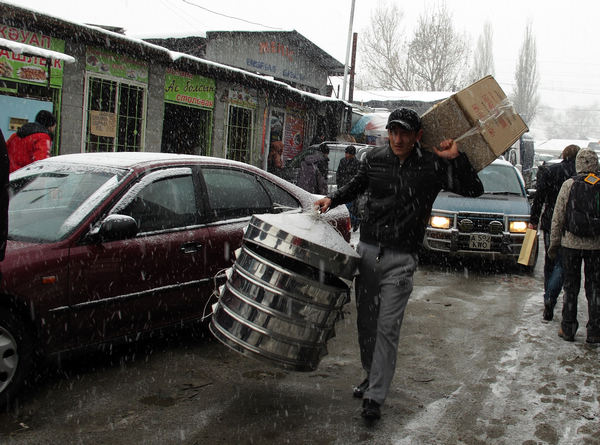 |
|
No one leaves the United Asia market empty handed. It is the largest wholesale and retail market in Almaty, and it specializes in products from China. [Photos by Jiang Dong / China Daily] |
Better quality
The theme from Journey to the West, a classic Chinese TV series, suddenly echoed through United Asia market, the largest wholesale and retail market in Almaty on a snowy weekday morning. It was actually a ring tone from the mobile phone a local resident was planning to buy.
Like every single item in the market, the mobile phone was made in China.
Almaty is the first and most important stop for goods passing through the Horgos port 376 km away. The city, the country's largest with 1.3 million people, sits in Kazakhstan's southeast corner and has always been the trading hub for China and Kazakhstan.
It was the capital until 1998, when the Kazakhstan moved the seat of government northwest to Astana because of Almaty's susceptibility to earthquakes and its proximity to the Chinese border.
Lin Zhenpeng, 36, who is from East China's Fujian province, has been selling stationery at the United Asia market since 2003. He said Kazakhstanis have become more demanding as their living standard has improved since the country gained independence 20 years ago.
"Now I have to stock more good-quality products rather than cheaper stuff with low quality," he said while discussing orders with local clients in fluent Kazakh and Russian.
It's not easy
Lin's business is good but it's getting tougher.
Customs now requires that shipping containers hold only one type of product to be declared. Containers with mixed goods are turned away.
"It's a nightmare for small traders like me, because if I can't find other people selling the products to fill the container, I simply can't do any business."
Lin said Chinese businessmen sometimes are targeted by local gangs demanding protection payments, but visa problems have become the most troublesome issue.
"Kazakhstan began to tighten its control over issuing work visas around 2006 to protect jobs for citizens, and they are harder and harder to get nowadays," Lin said. "As a result, many Chinese dealers have left the country. They had no choice."
Kazakhstan also tightened visa requirements for Chinese truck drivers at the beginning of 2011, financial news portal BNews.kz reported in late August. Later, China abolished multiple-entry visas for Kazakhstani truck drivers, reducing the flow of goods between China and Kazakhstan, Aliya Seylgazina, a marketing director for a Kazakh freight forwarding company, was quoted as saying.
Dozens of trucks were stuck at the Horgos border crossing because of drivers' visa problems, and in some areas of Kazakhstan, prices of Chinese goods rose by as much as 20 percent from June levels.
According to the latest immigration rule, Chinese enterprises in Kazakhstan are required to employ 10 local workers for every Chinese staff member.
Bigger market
Despite such problems, the future for Horgos is promising.
Belarus, Kazakhstan and Russia formed the Customs Union in January 2010, in the process making Horgos the gateway to a market of more than 170 million people.
Under terms of the union, customs borders among the three member countries were removed. The countries share tariffs proportionally, but also raised them, so some traders quit using Horgos as their entry point.
China Customs said the number of vehicles passing through the port last year dropped 23 percent from a year earlier - but the value of goods soared. The year's import-export total set a record of 3 trillion yuan ($471 billion), 69 percent more than in 2009.
